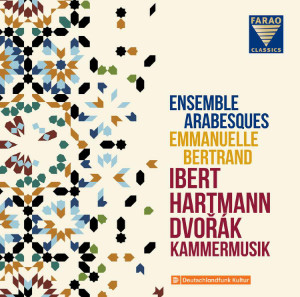
Jacques Ibert (1890-1962)
Concerto for cello and winds (1925)
Emil Hartmann (1836-1898)
Serenade, op. 43 (1885)
Antonin Dvořák (8141-1904)
Serenade, op. 44 (1878)
Emmanuelle Bertrand (cello)
Ensemble Arabesques
rec. 2021, Recital Hall, Laeiszhalle, Hamburg
Farao Classics B108115 [56]
The wind ensemble genre is a relatively new addition to my playlist. This release is an interesting combination of works, with the Dvořák being by some distance the best-known (and best). More often than not, it is paired with his Serenade for Strings, so the inclusion here of the very rare Hartmann and the not quite so rare Ibert is to be welcomed.
While Ibert called his work a concerto, it is certainly not a conventional one, even allowing for the accompaniment. It is only twelve minutes long, and only in the final movement (Gigue) does the cello get what one would describe as virtuosic writing; it is really a serenade with obbligato cello. And It is Ibert after all, so it is charming, light and delightfully entertaining.
Emil Hartmann’s compositional career was rather in the shadow of his father Johann Peter Emilius and his brother-in-law Niels Gade, the two big names of Danish music in the middle of the nineteenth century. His style is influenced by Schumann and Mendelssohn, without the level of inspiration to take it to the level of those greats. However, his Serenade is full of joyful moments, the shorter middle movements standing out.
1878 was Dvořák’s breakout year with the publication of his Slavonic Dances, helped in no small part by the intervention of Brahms with the publishers, Simrock. Dvořák premiered his Wind Serenade in the November of that year in a concert, comprising his music only. The Serenade was a great success, a critic writing that it was the “highlight of the concert” and gained a “veritable storm of applause”. It is one of his truly great works, full of magical scoring, helped by the inclusion of cello and double bass to round out the soundworld. Given that this is Dvořák, it seems almost superfluous to say that it drips with lovely melodies. I have another recording of it – a highly praised release by the Chamber Orchestra of Europe on ASV (CDCOE801, still available as a Presto CD) – and my impression is that the current performance is its equal.
Ensemble Arabesque is based in Hamburg, and this is their fourth recording for Farao Classics. The previous releases concentrated on single composers: Holst (review), Poulenc (review) and Ibert (review). Their performances have been unanimously praised by my colleagues, and I am certainly not going to offer a dissenting opinion. French cellist Emmanuelle Bertrand fulfils the relatively slight role in the Ibert with aplomb. The sound quality is extremely natural, and the notes are informative.
If, like me, you are relatively new to the genre, this release can only encourage you to explore it further. If you are already an aficionado, I have no doubt that you will be very impressed by the performances.
David Barker
Help us financially by purchasing from




















